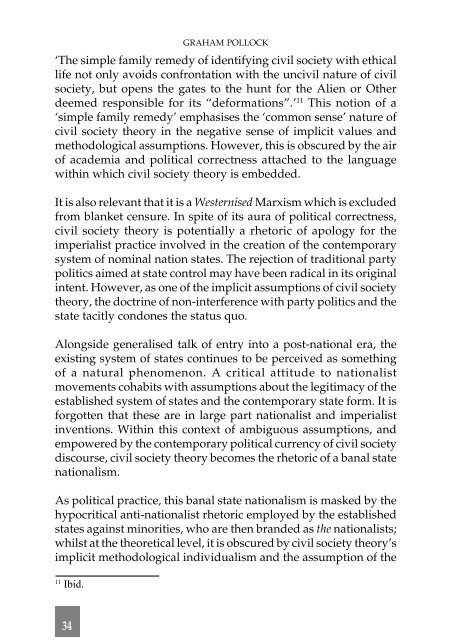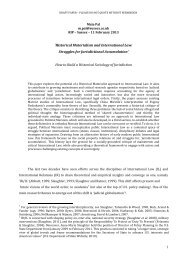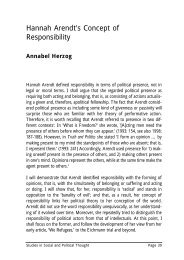Civil Society Theory and Euro-Nationalism - University of Sussex
Civil Society Theory and Euro-Nationalism - University of Sussex
Civil Society Theory and Euro-Nationalism - University of Sussex
Create successful ePaper yourself
Turn your PDF publications into a flip-book with our unique Google optimized e-Paper software.
34<br />
GRAHAM POLLOCK<br />
‘The simple family remedy <strong>of</strong> identifying civil society with ethical<br />
life not only avoids confrontation with the uncivil nature <strong>of</strong> civil<br />
society, but opens the gates to the hunt for the Alien or Other<br />
deemed responsible for its “deformations”.’ 11 This notion <strong>of</strong> a<br />
‘simple family remedy’ emphasises the ‘common sense’ nature <strong>of</strong><br />
civil society theory in the negative sense <strong>of</strong> implicit values <strong>and</strong><br />
methodological assumptions. However, this is obscured by the air<br />
<strong>of</strong> academia <strong>and</strong> political correctness attached to the language<br />
within which civil society theory is embedded.<br />
It is also relevant that it is a Westernised Marxism which is excluded<br />
from blanket censure. In spite <strong>of</strong> its aura <strong>of</strong> political correctness,<br />
civil society theory is potentially a rhetoric <strong>of</strong> apology for the<br />
imperialist practice involved in the creation <strong>of</strong> the contemporary<br />
system <strong>of</strong> nominal nation states. The rejection <strong>of</strong> traditional party<br />
politics aimed at state control may have been radical in its original<br />
intent. However, as one <strong>of</strong> the implicit assumptions <strong>of</strong> civil society<br />
theory, the doctrine <strong>of</strong> non-interference with party politics <strong>and</strong> the<br />
state tacitly condones the status quo.<br />
Alongside generalised talk <strong>of</strong> entry into a post-national era, the<br />
existing system <strong>of</strong> states continues to be perceived as something<br />
<strong>of</strong> a natural phenomenon. A critical attitude to nationalist<br />
movements cohabits with assumptions about the legitimacy <strong>of</strong> the<br />
established system <strong>of</strong> states <strong>and</strong> the contemporary state form. It is<br />
forgotten that these are in large part nationalist <strong>and</strong> imperialist<br />
inventions. Within this context <strong>of</strong> ambiguous assumptions, <strong>and</strong><br />
empowered by the contemporary political currency <strong>of</strong> civil society<br />
discourse, civil society theory becomes the rhetoric <strong>of</strong> a banal state<br />
nationalism.<br />
As political practice, this banal state nationalism is masked by the<br />
hypocritical anti-nationalist rhetoric employed by the established<br />
states against minorities, who are then br<strong>and</strong>ed as the nationalists;<br />
whilst at the theoretical level, it is obscured by civil society theory’s<br />
implicit methodological individualism <strong>and</strong> the assumption <strong>of</strong> the<br />
11 Ibid.
















